Paula Joan Caplan
Awardwinning Nonfiction Author & Playwright - Scholar - Advocate/activist - Speaker - Actor
 ...is a clinical and research psychologist, author of books and plays, playwright, actor, director, and activist. She was born and raised in Springfield, Missouri, attended Greenwood Laboratory School from kindergarten through twelfth grade, received her A.B. with honors from Radcliffe College of Harvard University, and received her M.A. and Ph.D. in psychology from Duke University. She is the daughter of the late Jerome A. Caplan and of Tac Caplan. Currently, she is an Associate at the DuBois Institute, Harvard University. She has been a Fellow at the Women and Public Policy Program of the Kennedy School of Government at Harvard; a Lecturer in Harvard's Program on Women, Gender, and Sexuality and in the Psychology Department. She is former Full Professor of Applied Psychology and Head of the Centre for Women's Studies in Education at the Ontario Institute for Studies in Education, and former Lecturer in Women's Studies and Assistant Professor of Psychiatry at the University of Toronto. (photo left: Paula J. Caplan by Lesley Bohm)
...is a clinical and research psychologist, author of books and plays, playwright, actor, director, and activist. She was born and raised in Springfield, Missouri, attended Greenwood Laboratory School from kindergarten through twelfth grade, received her A.B. with honors from Radcliffe College of Harvard University, and received her M.A. and Ph.D. in psychology from Duke University. She is the daughter of the late Jerome A. Caplan and of Tac Caplan. Currently, she is an Associate at the DuBois Institute, Harvard University. She has been a Fellow at the Women and Public Policy Program of the Kennedy School of Government at Harvard; a Lecturer in Harvard's Program on Women, Gender, and Sexuality and in the Psychology Department. She is former Full Professor of Applied Psychology and Head of the Centre for Women's Studies in Education at the Ontario Institute for Studies in Education, and former Lecturer in Women's Studies and Assistant Professor of Psychiatry at the University of Toronto. (photo left: Paula J. Caplan by Lesley Bohm)
Website: http://www.paulajcaplan.net/
Contact Paula: paulacaplan@gmail.com
| Here's just a few selections of Paula's work...Available at http://www.Amazon.com | |
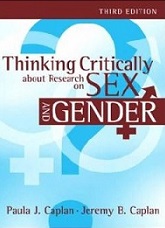 |
Thinking Critically about Research on Sex and Gender The only book about research on sex and gender with critical thinking as its core theme!
Thinking Critically about Research on Sex and Gender 3e is written to be easily accessible in very short chapters. The authors demonstrate that most of the claims about sex and gender are not well supported by research and then provide readers with critical tools they can apply to come to realistic, constructive conclusions. All of this is provided in a concise, inexpensive volume by a best-selling trade author and instructor team.
This book covers topics ranging from whether there are sex differences in the brain and hormones; sexuality and sexual orientation; math, spatial, and verbal abilities; aggression, dependency, and masochism; and mother-blame. |
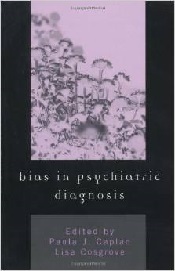 |
Bias in Psychiatric Diagnosis (first editor, also wrote or co-wrote many of its chapters) Bias in Psychiatric Diagnosis is the first book ever published about how gender, race, social class, age, physical disability, and sexual orientation affect the classification of human beings into categories of psychiatric diagnosis. It is surprising that this kind of book is not yet on the market, because it is such a hot topic, and the negative consequences of psychiatric diagnosis range from loss of custody of a child to denial of health insurance and employment to removal of one's right to make decisions about one's legal affairs. |
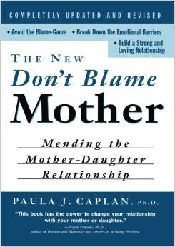 |
In this revision of her 1989 book of the same title, Caplan, a clinical and research psychologist, examines the pervasiveness of mother-blame in society and identifies ten myths surrounding motherhood (e.g., "good mothers" don't get angry). She takes an especially close look at the role psychologists and therapists have played in promoting these myths. The book's second half makes suggestions for improving relationships between mothers and adult daughters through honest communication and a rejection of the myths. Certainly, readers will question some of Caplan's views of women and mothers: she seems to overlook many healthy, thriving mother-daughter relationships, and not all readers will agree that the myth of male superiority is as widespread as the author suggests. Nevertheless, this work is well researched, with extensive notes and suggestions for improving relationships.
|
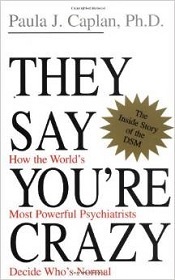 |
They Say You're Crazy: How The World's Most Powerful Psychiatrists Decide Who's Normal How are decisions made about who is normal? As a former consultant to those who construct the “bible of the mental-health professions,” the DSM (Diagnostic and Statistical Manual of Mental Disorders), Paula Caplan offers and insider’s look at the process by which decisions about abnormality are made. Cutting through the professional psycho-babble, Caplan clearly assesses the astonishing extent to which scientific methods and evidence are disregarded as the handbook is developed. |
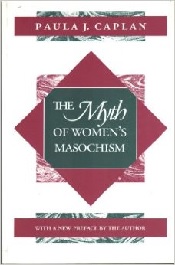 |
Soon after publication in 1985, The Myth of Women's Masochism became one of the most influential works in women's psychology. Paula Caplan rejects the accepted wisdom that women enjoy pain and abuse, and argues that, on the contrary, much of the pain women endure is to avoid further, or worse, treatment. Women stay with abusive husbands in order, for instance, to protect themselves and their children from the greater suffering of poverty. She makes the point that the quintessentially feminine traits of nurturing, patience, and self-denial are not pathological, as is often stated. Her book confronts the myth of women's masochism as it affects every aspect of women's lives; it challenges psychiatry to change the way it percieves women; and it offers women a positive new view of themselves.
|
 |
When Johnny and Jane Come Marching Home: How All of Us Can Help Veterans. Traumatized veterans returning from our wars in Iraq and Afghanistan are often diagnosed as suffering from a psychological disorder and prescribed a regimen of psychotherapy and psychiatric drugs. But why, asks psychologist Paula J. Caplan in this impassioned book, is it a mental illness to be devastated by war? What is a mentally healthy response to death, destruction, and moral horror? In When Johnny and Jane Come Marching Home, Caplan argues that the standard treatment of therapy and drugs is often actually harmful. It adds to veterans' burdens by making them believe wrongly that they should have "gotten over it"; |